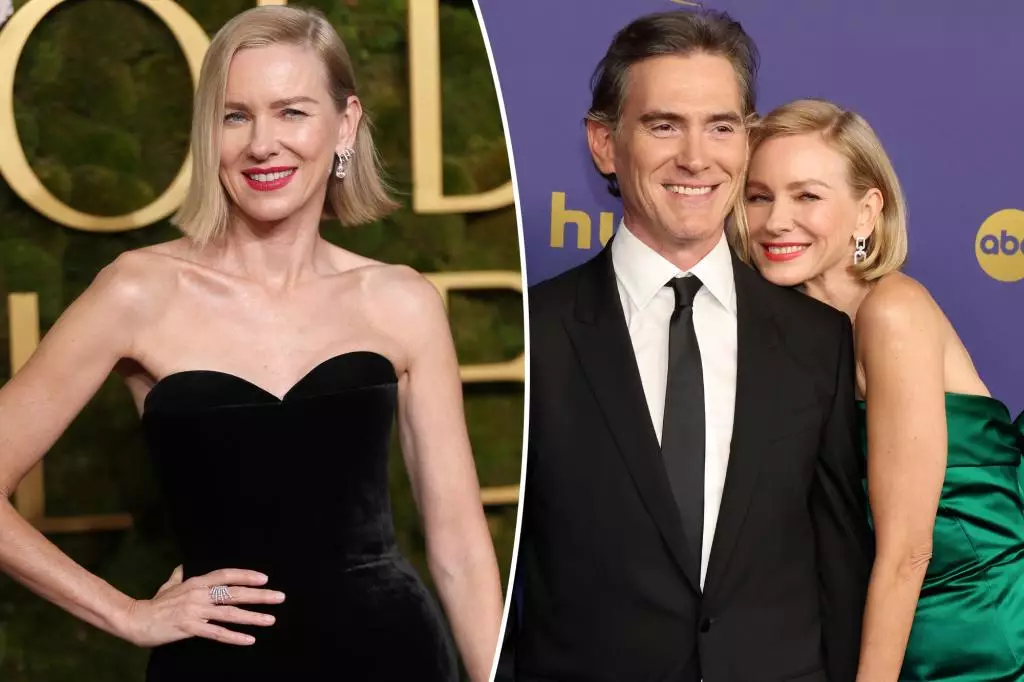In today’s world, open conversations about aging and the physical changes that accompany it often remain shrouded in a veil of silence. This societal reluctance can lead to discomfort and even embarrassment, as revealed in Naomi Watts’ candid reflections in her new book, “Dare I Say It: Everything I Wish I’d Known About Menopause.” The actress shares a personal story that highlights how intimacy and authenticity can transcend age-related anxieties, creating a deeper bond between partners.
Watts narrates an experience where she felt compelled to hide a hormone therapy patch while initiating a romantic encounter with fellow actor Billy Crudup. The worry that this patch might reveal her menopausal state is not just about the physical mark left on her skin; it encapsulates a universal anxiety about perceived loss—loss of youth, fertility, and sexual desirability. This situation forces one to confront how society views individuals, particularly women, as they navigate the complex transition of menopause.
The story takes a turn when Crudup, noticing Watts’ prolonged absence from their romantic setting, gently inquires about the situation. His response upon learning the truth encapsulates the essence of supportive partnership: “Hey, if it makes you feel better: I’ve got gray hairs on my balls.” This cheeky yet tender remark not only diffuses the tension but also subverts the traditional narrative that aging is a one-sided affair. Here is a man, equally affected by the passage of time, openly acknowledging his own imperfections.
This kind of interaction is vital; it showcases how humor can serve as a powerful tool in navigating discomfort. Watts, reflecting on Crudup’s comment, categorically states it remains “the most romantic words” she has ever encountered. This response symbolizes a vital truth in partnerships: that the bonds formed through vulnerability are often more enduring and deeper than those founded on idealized images.
Watts and Crudup’s relationship blossomed in an insular manner, away from the public eye, after they met on the set of their Netflix series “Gypsy.” They chose to keep their connection private, which speaks volumes about the nature of modern romances. Amidst a culture that increasingly glorifies public relationships and social media spectacles, their choice to navigate love outside those arenas suggests a mature understanding of personal boundaries and respect for each other’s journeys.
Their eventual engagement and subsequent marriage, punctuated by the genuine care they show for one another, highlight a refreshing change in relationship dynamics. Prior to Crudup, Watts had a lengthy relationship with Liev Schreiber, which ended amicably, showcasing an ability to transition from one significant chapter of life to another with grace. Meanwhile, Schreiber has also moved forward, getting married and welcoming a child, further emphasizing the importance of moving on and allowing oneself to embrace change.
Watts and Crudup’s story further reinforces the idea that romance does not diminish with age; rather, it evolves into something that can be richer and more nuanced. The challenges presented by aging—whether physical, emotional, or psychological—demand that partners foster a connection founded on understanding and support. Their dialogue illuminates the power of shared vulnerability in deepening relational intimacy, encouraging the message that true love flourishes in accepting one another, blemishes and all.
The intimate recounting of their experiences reminds readers that embracing the full spectrum of life, with its insecurities and transformations, can lead to stronger relationships. As they navigate the complexities of life together, Watts and Crudup serve as a model for how intimacy can flourish in the face of life’s inevitable changes, teaching us that it’s not just about defining love through the lens of romance, but through partnership, growth, and inclusion.

Leave a Reply